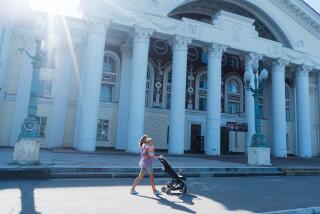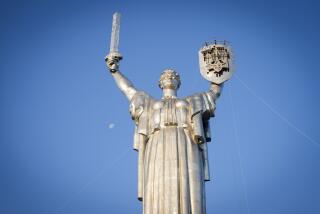Moscow Mayor Puts His Stamp on City Skyline
- Share via
MOSCOW — A statue 300 feet high is rising out of the murky Moscow River, a monument to grandiose political ambition both past and present.
The towering bronze figure being welded together on an artificial island in mid-river, within sight of the Kremlin, is that of Russia’s all-conquering Czar Peter the Great. He dragged a reluctant Russia into modern Europe 300 years ago, giving it its first sea access and fleet.
But analysts say the real point of the memorial, which when completed will dwarf riverfront buildings, is to remind voters that the man who commissioned it, Moscow Mayor Yuri M. Luzhkov, has his eye on the Russian presidency.
“Of course, this memorial is directly connected with Luzhkov’s campaigning,” said Sergei A. Markov, a political analyst at the Moscow Center of the Carnegie Endowment for International Peace.
With 65-year-old President Boris N. Yeltsin awaiting heart surgery this winter and no clear successor in sight, his four lieutenants are jockeying for power in an undeclared presidential campaign.
Security chief Alexander I. Lebed, Prime Minister Viktor S. Chernomyrdin, presidential administration chief Anatoly B. Chubais and Luzhkov are raising their respective profiles with headline-grabbing projects. Chernomyrdin is promoting St. Petersburg for the 2004 Olympics, and Lebed has negotiated a dramatic end to Russia’s war in Chechnya. Meanwhile, Luzhkov is building.
Under the brisk, squat, fist-thumping mayor, the capital has turned from a sad post-Soviet mess to a glitzy, if vulgar, metropolis often compared unkindly to Batman’s Gotham City. Marble-lined shopping malls, casinos and banks have sprung up between crumbling apartment blocks.
Immensely popular in his home base, Luzhkov won 88% of votes in city elections this summer, after four years in charge. Since then, Luzhkov has tried to extend his influence beyond the city.
“Luzhkov started his campaign about a month ago. Now he’s on television every day, expressing opinions about the war in Chechnya, the problems of Russians in Estonia and conflict in Belarus--not the usual subjects for a Moscow mayor,” Markov commented.
Controversial Georgian artist Zurab K. Tsereteli, who designed the Peter the Great memorial, is one of a tightknit group of Luzhkov associates, and he does much of Moscow’s municipal sculpture. He scoffs at the idea that the mayor is using building projects as a steppingstone to the presidency.
“It’s even funny. These [Luzhkov’s men] are people who work all the time, day and night, every day, and every day they are adding to the riches of Russia and of Moscow,” Tsereteli said.
His statue, which city architect Vladimir A. Budayev said will cost $20 million by its completion at the end of October, will show Peter steering a ship with a map of Russia in his hand.
*
Whether the statue, which marks the 300th anniversary of the founding of Russia’s fleet, is appropriate for Moscow except for modern political reasons remains in doubt.
Peter disliked Moscow so much he moved away and built a new imperial capital, St. Petersburg.
But the way in which it has come into being is a clear illustration of Luzhkov’s autocratic modus operandi. The liberal Moscow intelligentsia did not get a chance to wince and pan Tsereteli’s latest project as garish, as they have about others. The traditional “consultation with the people”--a public display of the plans--did not take place.
“Muscovites used to set their opinions out in big ledgers,” the weekly Moscow News mourned. “The powers that be would peruse them and then go ahead anyway, studiously ignoring what they had read. But at least those projects were public knowledge.”
More to Read
Sign up for Essential California
The most important California stories and recommendations in your inbox every morning.
You may occasionally receive promotional content from the Los Angeles Times.













